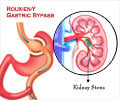Patients who have had bariatric surgery need to take special steps to make sure they are absorbing their medications and nutrients, according to a study.
Authors April D. Miller, Pharm.D, of University of Kentucky HealthCare, and Kelly M. Smith, Pharm.D., of University of Kentucky College of Pharmacy, examined previously published literature to assess potential problems that bariatric surgery patients may have with absorption of mediations and nutrients.The authors focus on Roux-en-Y (pronounced “rue-on-why”) gastric bypass, which is the type of bariatric surgery most often performed in the United States. This form of gastric bypass surgery is associated with more absorption problems than other procedures because it combines techniques that restrict the amount of food passing through the stomach and impair the ability of the small intestines to absorb nutrients.
This combination of approaches creates the need for special considerations to help patients get the best results from their medications, according to Miller and Smith. “Both the smaller stomach size and the decreased absorption ability of the small intestines can mean that medications may not work as intended,” said Smith. “It’s important for physicians and pharmacists to be aware of these patients’ special needs in order to make the best choices about appropriate medications.”
Extended-release and delayed-release medications may not work properly because of the shortened small intestine, explains Smith. She adds that some of the necessary changes could be as simple as prescribing a liquid medication, which is more easily absorbed than a tablet or capsule, and using immediate-release formulations. The study also notes that patients could benefit from medications that are administered with patches worn on the skin, injection, suppositories, or nasal spray.
Nutrient deficiencies may also be a problem, including deficiencies of calcium and fat-soluble vitamins (A, D, E, and K). Patients are also at higher risk for developing anemia because of deficiencies in iron, vitamin B12 and folate. “After bariatric surgery, all patients should take a daily multivitamin and calcium supplementation – preferably in a powder or liquid form to enhance absorption,” said Miller. “Monthly B12 injections and early bone density testing should also be considered.”
Source-Newswise
SRM









